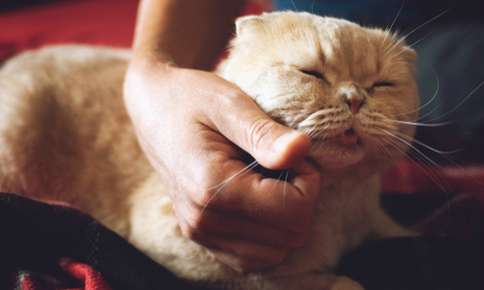
How Cats Express Affection
Cats have an undeserved reputation as cool, aloof creatures. Although it’s certainly true that cats aren’t quite as demonstrative as dogs, felines do show affection in subtle ways. Cheek rubs, head butts, vocalizations, and other behaviors let you know how much your cat cares about you.
10 Ways Cats Display Affection
Cats aren’t solitary animals. When they’re in the wild, they form colonies with other cats. When they live with you, you become a cherished member of their colony. Your cat demonstrates his or her connection and affection for you with a variety of behaviors, including:
- Cheek Rubbing. Cats only rub their cheeks against their favorite people and things. Scent glands on your pet’s cheeks produce pheromones that are transferred to you when your cat rubs against you. Pheromones are natural chemicals that help cats communicate with each other in the wild. The chemicals are often used to mark territory, bond with other cats or identify unfamiliar cats. Cheek rubbing is your cat’s way of announcing to the world, “This human is mine!”
- Head Butting. Your cat’s forehead also contains scent glands that release pheromones. A gentle head butt not only shows affection but combines your scent with your cat’s scent.
- Tail Position. Your cat’s tail provides valuable clues regarding his or her emotional state. When a cat is afraid, it’s tail puffs up in an attempt to intimidate other animals. An upright tail that curves slightly at the top is a sign that your pet is happy and content. A happy cat may drape its tail over you or press the tail against you while winding through your legs.
- Meowing. Does your cat begin meowing the minute you walk through the door? The vocalizations are his or her way of greeting you and expressing pleasure that you’ve returned.
- Purring. Cats purr when they’re happy, and what could make them happier than spending time with you?! Purring usually signifies that your pet feels safe and secure but, it can also be a sign that your cat is in pain.
- Kneading. Some cats show affection by kneading their favorite people. Kittens move their paws back and forth on their mothers’ fur when nursing to stimulate milk production. When your adult cat kneads you, it means that you’re a very important person in their world.
- Eye Contact. A slow blink is your cat’s version of a kiss on the cheek. You can return your pet’s affection with your own slow blink.
- Grooming. If you have more than one cat, you’ve probably noticed that your pets enjoy licking each other. Grooming is a way to strengthen emotional bonds and show affection, whether your cat grooms another pet or you.
- Shadowing You. Your cat also shows affection by spending time with you. Contrary to popular belief, cats don’t just follow you around the house because they want food, although they’ll probably be glad to accept a treat or two. When researchers studied the type of stimuli cats prefer, they discovered that social interaction with humans topped the list, followed by food. The study appeared in the August 2017 issue of Behavioral Processes.
- Rolling. Cats normally avoid exposing their vulnerable bellies to the world. If your pet rolls on the floor and shows you his or her belly, it’s a sure sign that you’ve won your pet’s trust.
In addition to affection, regular veterinary care is an important part of every cat’s life. If your cat is due for a checkup or is experiencing any health problems, call us to schedule an appointment.
Sources:
Psychology Today: How Do Cats Show Affection to Humans?, 9/17/18
Purina: How Do Cats Show Affection?
Catster: How Do Cats Show Affection? 7 Cat Affections Signs, 8/5/19
